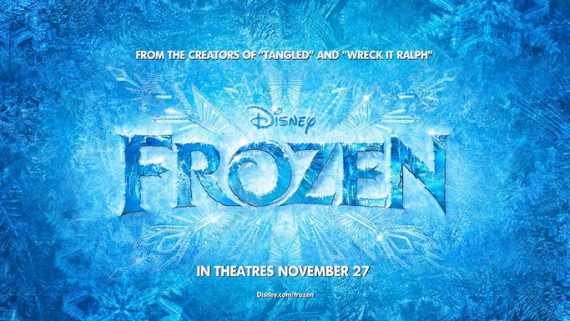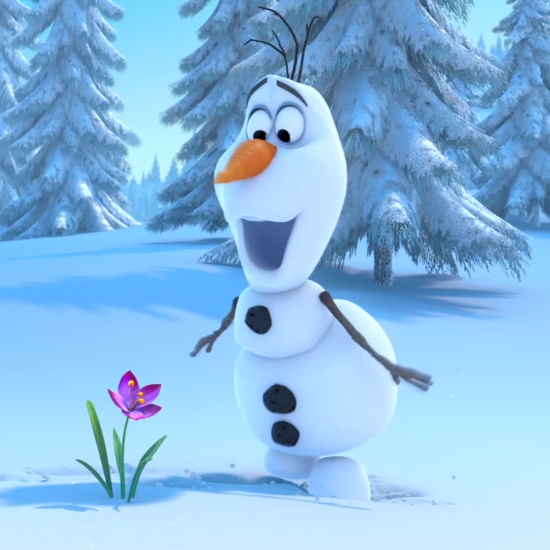Last updated on June 14, 2014
 Frozen is a film that succeeds brilliantly at reviving the long lost art of the Disney musical – or, at the very least, it makes huge strides in removing the Pixar stranglehold on all things animated. Thank goodness; I was almost going to hurt myself if I had to see yet ANOTHER fish-out-of-water story from them, and I think two decades worth is quite enough, thanks.
Frozen is a film that succeeds brilliantly at reviving the long lost art of the Disney musical – or, at the very least, it makes huge strides in removing the Pixar stranglehold on all things animated. Thank goodness; I was almost going to hurt myself if I had to see yet ANOTHER fish-out-of-water story from them, and I think two decades worth is quite enough, thanks.
At the same time, Frozen leaves me cold in more ways than one, and to explain this will require quite a bit of SPOILERS on my part, so you have been forewarned.
Frozen uses all of the “fairy tale princess” tropes to their most blatant and effective ends. You’ve got the princess, the knight in shining armor who isn’t the first guy you meet, of course not – what’s within counts more than your outside appearance, of course. Comic relief abounds from Olaf, one of my favorite Disney characters in a long time. Actually, I found the film did not make it very clear which character was our main protagonist, but we do find out about twenty minutes into the film – that was the least of my worries though. Anna, who is the main character, goes on a journey of self-discovery from a sheltered life, and ends up learning about independence, true love, and self-reliance.
I am absolutely for all these things; an independent woman does not frighten me, and I’m happy they went this route. The problem comes less in the desire to create such a protagonist and the execution of that ideal. They want a traditional Disney film, but they also want to appeal to our current cultural sensitivites. They tried, but they didn’t have the cake nor eat it at the same time. The movie structures itself around traditional Disney movie tropes simply to subvert them, and this makes the consistency of the narrative suffer. The ending, especially, ruins everything. Like most movies in this vein, you expect the male and female lead to fall in love, right? They spent equal time developing that as characters, they show Kristoff and Anna getting to know each other, and I guess we know that things will work out, right?

Not in the land of Frozen! See, there’s this thing we call a “message”, and Frozen comes right out and says it: familial love is more important than romantic love. Anna saves Elsa in an act of sacrificial love while Kristoff watches on. That would be all well and good, but you relegate everyone to the sidelines by default (as I just mentioned). If you develop a character, and then put him in a prime position to fall in love, you take that opportunity. Instead, Frozen turns Kristoff into a secondary character that was necessary only as a vehicle to bring Anna to her own realizations. His time and effort mean nothing in the end; he’s in love, but he must rely on whether Anna wants to involve herself with him at all. In fact, he has to ask permission to kiss her at all in the end, which is completely weird in strange in a film like this – as if she wouldn’t be willing after all this at all (because to say otherwise would mean “rape culture” and all that. SIGH). He literally exists for no reason other than that (and the occasional comedic relief). His character arc has no end, and it just ambles off after Anna’s arc finishes. They aren’t equal partners; Anna controls Kristoff and determines his destiny. Only one party rules here, an unequal relationship if I’ve ever seen one.
The same goes for Elsa. Because it focuses so much on Anna, Elsa exists as yet another MacGuffin for the story to progress. I guess she sorta learns to be herself without fearing the judgment of other people, but she’s barely in the film at all except to present us with a problem to solve that isn’t directly evil, just misunderstood. Our “evil force” in this tale amounts to little more than “slimy opportunist”, and Hans really adds a whole lot of nothing right at the end of the movie. He exists purely to make Anna question the “falling in love” thing which leads to the sacrificial decision at the end of the movie. In the original Snow Queen tale, she would be the villain of the piece, but once your remove that material Elsa’s got nothing to do except be scared and run away from things. Unfortunately, Elsa provides a rather one-note performance that doesn’t allow her to progress due to Anna’s importance in the narrative. Anna is the important sister, not Elsa, and the narrative does nothing to convince me otherwise.
I would also mention that, apart from the notion of magical powers involve ice and snow, Frozen literally takes zero material from the original Hans Christian Anderson tale. Unlike, say, previous Disney animated classics, they’ve chosen to completely revamp the entire story – this probably accounts for the weird inconsistencies that I’ve just listed above. Previous efforts by the House of Mouse stayed true to their origins in many ways, but Frozen doesn’t bother to make a hint of an attempt, really, completely avoiding the good/evil contrast entirely. I see why, of course, but it’s a little disappointing when “re-imagining” means “completely re-doing”. If Anderson were alive, he’d be pretty sad.
You might call me a reductionist here, telling me that most stories at their base exist to push the character along their intended development. The problem with that line of thought is that we did see character growth in all of them that suddenly stops for no good reason. Well, that reason consists of a pro-feminist message, I suppose, but one that relegates all but the individual Anna to the sidelines. By subverting the tropes it employs right at the end, it undoes all of the work preceding it for no reason other than to appeal to popular culture at large and to be “edgy” (though I am stretching that point a bit).
And the film itself is so good, though! The songs are great, it’s funny, the dialogue works for the most part, the setting is original, it’s a musical, it looks great, etc. But the ending ruins everything, really! I enjoyed myself thoroughly, and then left the film with a bitter taste in my mouth. Such a love hate relationship with this movie!
